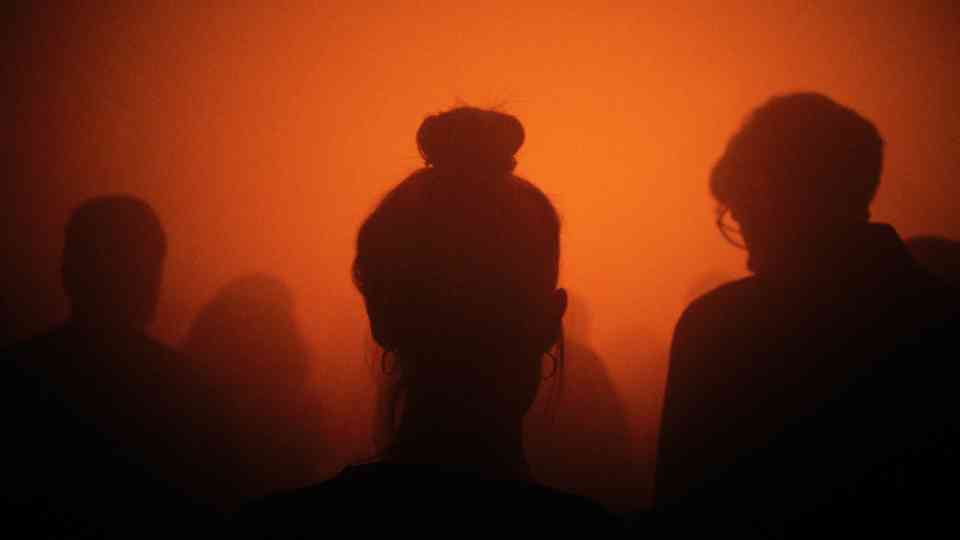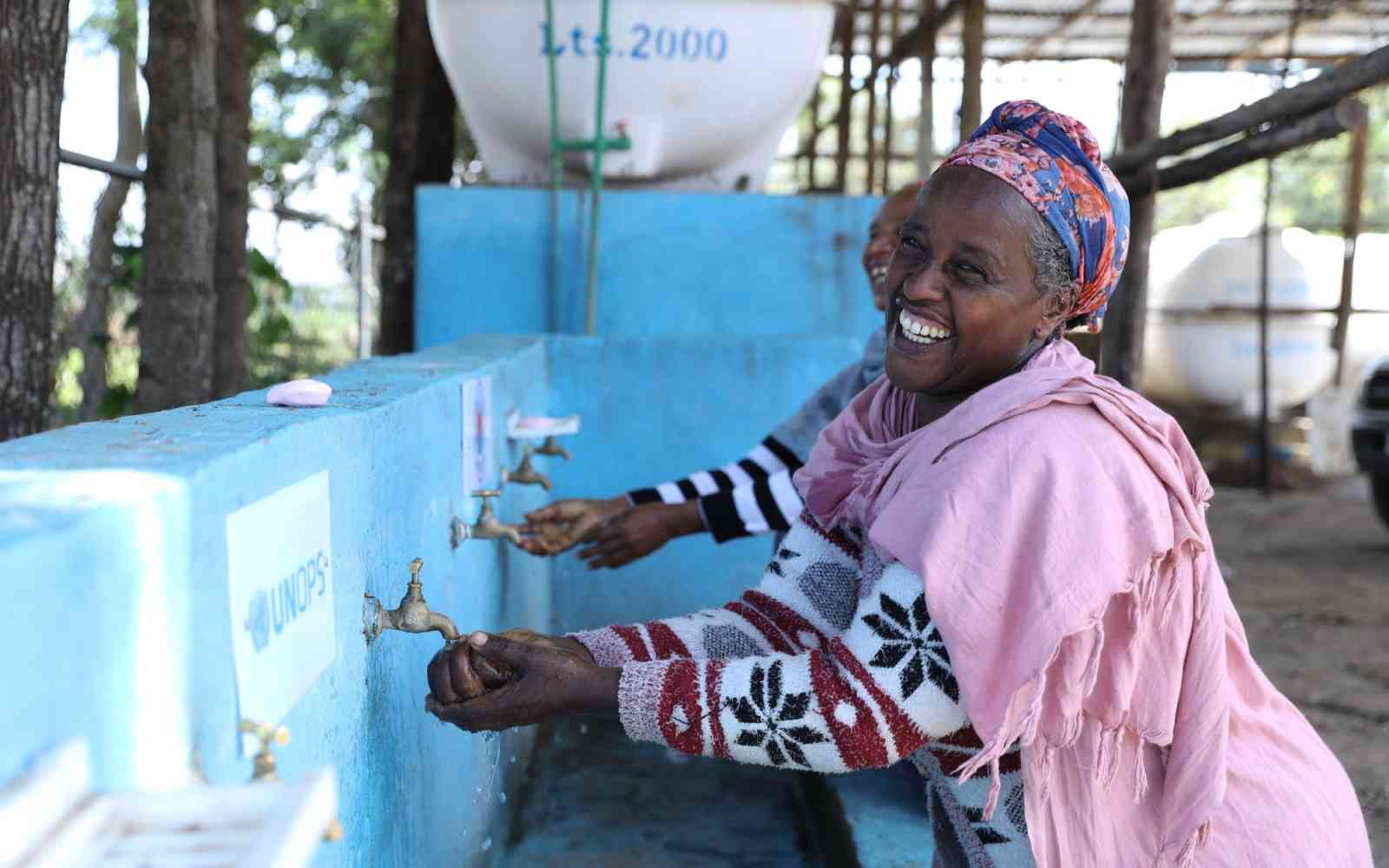The United Nations Office for Project Services (UNOPS)
Increasing access to basic services in Tigray
The conflict in northern Ethiopia has had a devastating impact on millions of people and left communities, including those in Tigray, without access to basic services.
This article was originally published 15 June 2023. Some of the information has been updated.
Latest updates
9 April 2025
The Edaga Hibret Health Centre, in Asgede Woreda, Tigray, has been rehabilitated to serve 20,000 patients.
Key upgrades to the facility include a new pharmacy block to enhance medical supply storage and distribution; a hybrid toilet building with a septic tank and soak-away pit for improved sanitation; a reliable water supply system to enhance hygiene standards; an electrical system that will ensure uninterrupted operations; and a range of external works, including walkways and water points to create a secure and accessible environment.
The May Hanse Primary School, also in the Asgede Woreda, has been reconstructed to provide a safe and conducive learning environment for students who previously lacked access to education.
Infrastructure improvements to the school include two new classroom blocks, each comprising 6 classrooms that can accommodate up to 50 students per classroom; a hybrid toilet building with modern sanitation facilities; water supply and electrical systems; and external works including fencing, walkways and landscaping. UNOPS also procured and delivered classroom equipment. The school can now accommodate more than 1,900 students.
Both the health centre and primary school were officially handed over to the regional government on 8 and 9 April 2025.
Read more here.
19 December 2024
Megab Primary School and Mariam Zala Primary School in Hawzen, Tigray have been successfully reconstructed, improving educational conditions for more than 1,800 students.
The renovations included adding more classrooms, walkways, water points, hybrid toilet buildings, improved sanitation systems as well as accessible and inclusive facilities for students with disabilities for both schools.
Read more here.
8 December 2024
The renovated Jijike Primary School – located in Abergelle, Tigray – has been handed over.
The school now has a renovated administration building, eight renovated classrooms, improved sanitation systems and accessible, inclusive facilities for students with disabilities, among other improvements, benefitting more than 1,500 students and more than 30 teachers.
Read more here.
6 September 2024
A workshop focused on the risk assessment analysis in the water, sanitation and hygiene sector was organized as part of the 'Response Recovery Resilience for Conflict-Affected Communities in Ethiopia' project.
UNOPS developed a tool that evaluates potential vulnerabilities within existing or planned infrastructure and helps to identify risks related to technical, environmental and socio-economic factors.
The workshop officially marks the beginning of the implementation of the Resilience WASH Programme within the project.
Read more here.
22 February 2024
The reconstruction of 14 health centers, 11 primary schools and 33 communal and institutional water, sanitation and hygiene facilities in Tigray has been successfully completed.
The rapid response activities were implemented in Abergele, Asgede, Endemahoni, Hawzen and Hintalo.
The project has now moved to the recovery phase, which will include the reconstruction of additional health, education and water, sanitation and hygiene facilities.
Read more here.
15 December 2023
Megab Primary School and Megab Health Centre have been successfully reconstructed after suffering extensive damage due to conflict.
Megab Health Centre will better serve more than 18,000 people in the local community.
Megab Primary School now has an improved learning and teaching environment for more than 900 students and more than 30 staff members.
Read more here.
30 November 2023
The Jijike and Gera Health Centres in Abergele have been successfully reconstructed after suffering extensive damage due to conflict and handed over.
Jijike Health Centre's entrance now also includes a ramp to allow for easier access for people with physical disabilities.
Gera Health Centre also has a new toilet block to improve sanitary conditions.
Combined, the centres will provide health services for more than 22,000 people.
Read more here.
23 October 2023
May Hayde Primary School and Ara Asegede Health Post in Hintalo were successfully reconstructed after suffering extensive damage and handed over.
Ara Asegede Health Post, which now has improved sanitation facilities, serves 25,000 people.
The rehabilitation of five classroom blocks and the administration building of May Hayde Primary School enhances the learning environment for students. In addition, the school was equipped with 200 new desks and 16 blackboards.
Read more here.
15 September 2023
The recently reconstructed Dongolat Primary School and Dongolat Health Center have both been officially completed, ensuring more than 600 students now have access to education and more than 15,000 patients have better healthcare.
The project also provided nearly $10,000 to cover four months of stipends for teachers to enable them to return to the classroom.
Both the health centre and the school received new ramps to make it easier for people with disabilities to access the buildings.
The reconstruction process of both facilities used locally sourced construction materials and provided employment opportunities for more than 100 local workers.
Read more here.
17 August 2023
Millions of Ethiopians have been devastated by the fighting in the country’s north. Educational facilities suffered significant damage, with schools, furniture, textbooks and laboratory equipment destroyed – forcing many children out of school.
So far, UNOPS has procured 3,000 desks and 240 blackboards for 15 primary schools in Tigray.
Since November 2020, the conflict has damaged or destroyed water sources, depriving many people of access to clean water. Educational facilities have also suffered significant damage, with schools, furniture, textbooks and laboratory equipment destroyed – forcing many children out of school. And fragile and deteriorating health services have increased the vulnerability of communities.
On behalf of the government of Ethiopia, UNOPS is implementing a project aimed at rebuilding and improving access to basic services and climate-resilient community infrastructure, as part of the larger World Bank-funded 'Response Recovery Resilience for Conflict-Affected Communities in Ethiopia' project.
UNOPS is working with local neighbourhood relations committees to rehabilitate and improve access to social services such as water, sanitation, health and education, to support more than 365,000 people in 5 woredas affected by conflict.
This project will help support the resumption of essential social services in selected conflict-affected woredas [districts] in Tigray.
The committees – which comprise a broad mix of people from each community, including women and older people – help ensure each community's needs are highlighted and reflected in the implementation of the project.
Since the launch of the project, 12 primary schools and 12 health centres have been rehabilitated. Stipends have also been paid to more than 400 healthcare workers, enabling health centers to open and provide services to the community. In addition, more than 400 teachers have also received stipends, enabling more than 10,000 girls and boys to return to school.
In addition, damaged water and sanitation infrastructure such as pipes and reservoirs are being rehabilitated. Water points, additional pipes and solar power infrastructure will also be constructed.


















